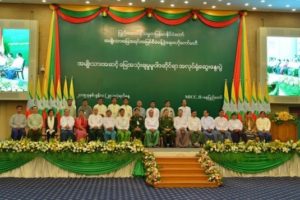
Over the past year, USAID and other donors have supported the government of Burma and civil society organizations on the development of the country’s first National Land Use Policy. In particular, donors have supported multi-stakeholder forums that give civil society and government a chance to constructively critique drafts and identify common solutions. This process has opened up dialogue between government and civil society on a variety of topics, including the rights of ethnic communities.
The draft policy would strengthen the rights of local populations by re-categorizing ethnic ancestral lands in accordance with the new land law and would halt the granting of concessions on existing categories, such as forest, farm, or fallow land, before completing the re-categorization. “(Through these forums) we have seen improvements in respect for ethnic rights. But there are still limitations,” said U Zaw Win Phyo, the chair of Resource Rights for Indigenous Peoples.
Civil society groups have welcomed the acceptance in the policy of traditional dispute settlement practices, and inclusion ethnic representatives in dispute-settlement procedures. Yet, questions around how traditional dispute resolution would interact with state processes remains contentious. “The traditional dispute settlement mechanism is recognized at the community level, but when the dispute is referred to the court, the mechanism should not contradict the existing judicial system. The decision will be made by the judge,” said U Tint Swe, the Director of the Forest Administration Department of the Ministry of Environmental Conservation and Forestry.
The multi-stakeholder forum held in June 2015 to discuss the 6th draft of the policy decided to send the inputs of ethnic organizations regarding the role of traditional dispute settlement to the Land Use Scrutiny and Allocation Central Committee, a government body led by Vice President U Nyan Tun. The Committee promised to update the draft in keeping with the decisions taken by the multi-stakeholder forum. The success of this process in raising and addressing contentious issues has been praised by both government and civil society, and is likely to act as a model for future policy processes in Burma.

